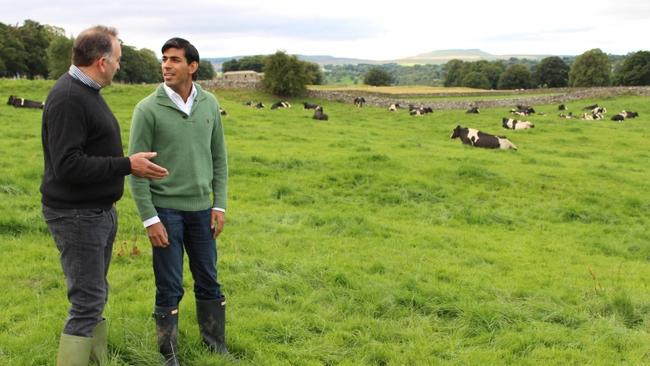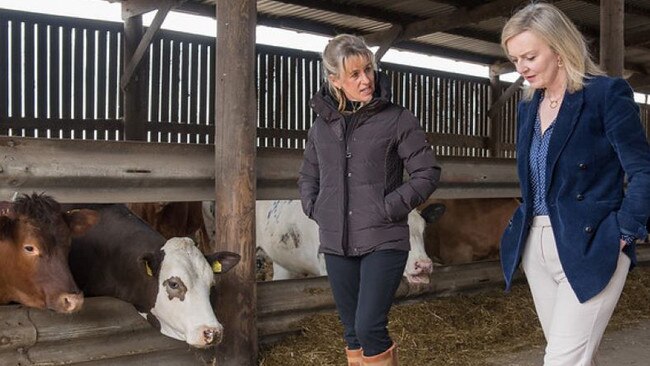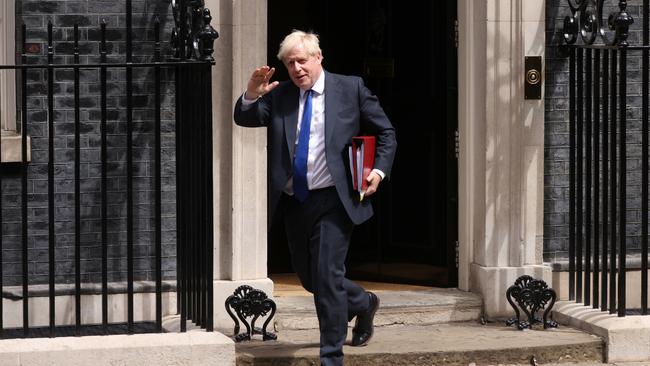Liz Truss and Rishi Sunak attempt to win rural votes in Downing St race
Margaret Thatcher used to keep her eyes on her Downing Street neighbours’ milk consumption — now two MPs representing dairy regions are vying for her old job.
Margaret Thatcher famously loathed government extravagance – even colleagues with an extra milk bottle on their doorstep weren’t spared.
According to her long-time adviser Tim Bell, the British PM would keep tabs on the milkman’s deliveries as he placed bottles in front of the Downing Street flats.
The Iron Lady, of course, resided in Number 10, while the treasurer, Geoffrey Howe and his wife Elspeth, were next door at Number 11.
Mrs Thatcher was not impressed by the Howe’s lactose largesse.
“How much milk has Elspeth had?” she asked Bell.
Four decades on, milk and troublesome treasurers remain a well-worn theme around Downing Street.
Like Thatcher and Howe, outgoing PM Boris Johnson and his treasurer Rishi Sunak had a very public falling out.
Sunak is now one of two contenders to replace Johnson as British prime minister.

The other is Foreign Secretary Liz Truss, who is aiming to follow in Thatcher’s footsteps and become the UK’s third female leader.
While Fleet Street have been focused on Truss and Sunak’s policies on tax, immigration and Ukraine, Sunak and Truss both represent electorates that are primarily agricultural.
Sunak has represented Richmond since 2017, a Yorkshire constituency famed for Wensleydale cheese.
Truss has been in parliament since 2010, as the representative of South West Norfolk, a seat also home to many dairy farms.

UK Dairy Industry Newsletter editor Catherine Paice said runaway inflation and costs are putting a huge squeeze on dairy farmers and processors.
“That’s compounded by issues here with trade with Europe, labour and logistics as the twin trauma of Covid and Brexit continue to challenge businesses,” she told The Weekly Times.
“Processors are still increasing farmgate milk prices for August and September as milk supply continues to run below last year’s levels, made worse by the August drought.
“Farmers are facing their own severe cost increases and a harsh autumn and winter with high feed and fertiliser costs, and processors are partly trying to support them and partly securing supply.
“I was told by one cheesemaker last week that their processing costs had increased by 85 per cent in the past year, and he was paying his farmer suppliers 55 per cent more.”
Farmers and processors have warned recently that the UK is on the edge of dairy shortages as a crippling lack of workers forces farmers to slash production.
Arla Foods last week predicted that retail dairy prices would surge higher with UK grocery bills already rising at the fastest pace since the 2008-09 recession.

“The average farmgate milk price in the UK in June was 42.7 pence per litre, which is 42 per cent higher than the same time last year,” Ms Paice said.
“Since June, by my reckoning, farmgate prices have increased by an average of close to two pence per litre per month in July-August, with September indicating another one pence per litre to come.”
Australia’s agricultural workforce shortages are echoed in the UK.
Dairy industry commentator Chris Walkland said a lack of available workers was already a factor prior to the UK’s withdrawal from the European Union.
“The main challenges for farmers are labour and confidence to stay in and invest I’d say,” Mr Walkland said.
“There are so many hurdles in the way of making an investment and the easiest decision to make is to not invest.
“Labour is a nightmare. One tone of the Brexit debate since the referendum in 2016 has been ‘we don’t like foreigners’. Consequently many very good foreign workers who used to work on farms have left. Farmers cannot recruit local people either.”
Opinion polls point to a decisive Truss victory in the coming week, with UK farmers more inclined to back the foreign secretary over Sunak.
Only time will tell what this will mean for dairy and the wider agriculture industry.





